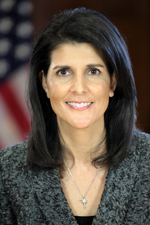The Iranians have been providing ample support to their ally the Syrian regime in that nation’s civil war and now have tag-teamed to set up so-called “de-escalation zones” there as well. But despite Iran’s notable influence in Syria now, the United States is insisting they won’t be a part of Syria’s leadership moving forward.
After praising the coalition efforts fighting ISIS in Syria, U.S. Ambassador to the United Nations Nikki Haley said on Friday, “I think we’re also looking at post-ISIS—what does that look like? And I can tell you, Iran is not going to be in charge, and Iran is not going to have any sort of leadership in that situation to where they could do more harm.”
Haley’s comments, published to the White House website, came in response to a reporter’s question about the “de-escalation zones” in Syria set up recently in a deal involving Iran. The BBC reported on Friday that Turkey and Russia were also in on the arrangement, which tone down the fighting in the area but still permit attacks on militant organizations.
Despite not being named as a participant in the de-escalation plans, Haley said that the U.S. still expects to have an impact in shaping Syria and still believes that dictator Bashar al-Assad should go.
“I think we’re not going to be satisfied until we see a solid and stable Syria, and that is not with Assad in place,” said Haley. “But what we are going to do is continue to be very effective and be a part of that process so that we get to a resolution.”
Haley said that Syria would be a topic on the agenda during this week’s United Nations General Assembly meeting. U.S. President Donald Trump will speak to the annual U.N. meeting for the first time, and the Trump Administration will also make additional comments during the U.N. event, which also provides opportunity to hold discussions with other nations’ representatives, including Israel.
Haley said she expected “strong”, serious, and impactful discussions on Syria. Said Haley on discussing Syria at the U.N., “I think we continue to be strong in making sure there’s no chemical weapons and making sure that we’re looking at the humanitarian situation. But the U.S. is a very strong partner in the resolution for Syria and will continue to be until we know that everything is stable.”
(By Joshua Spurlock, www.themideastupdate.com, September 17, 2017)

